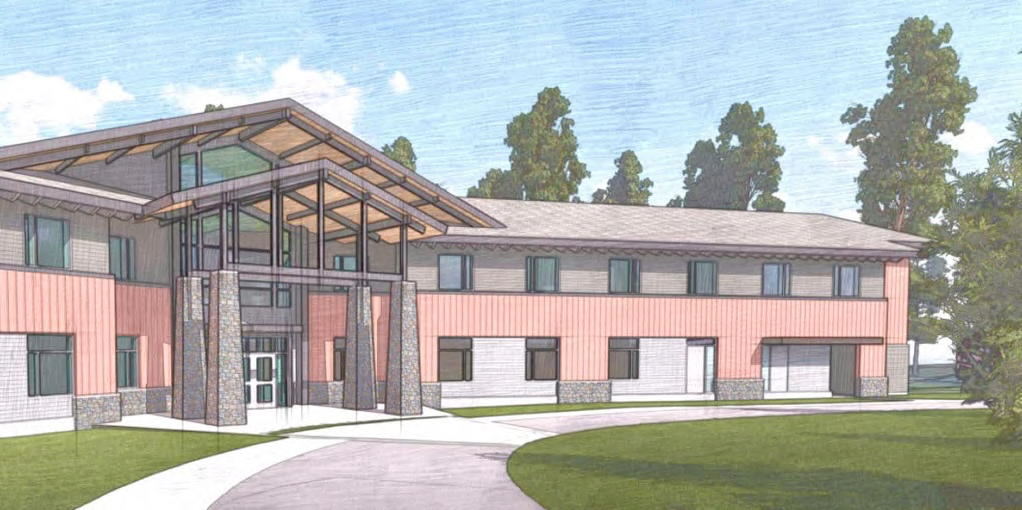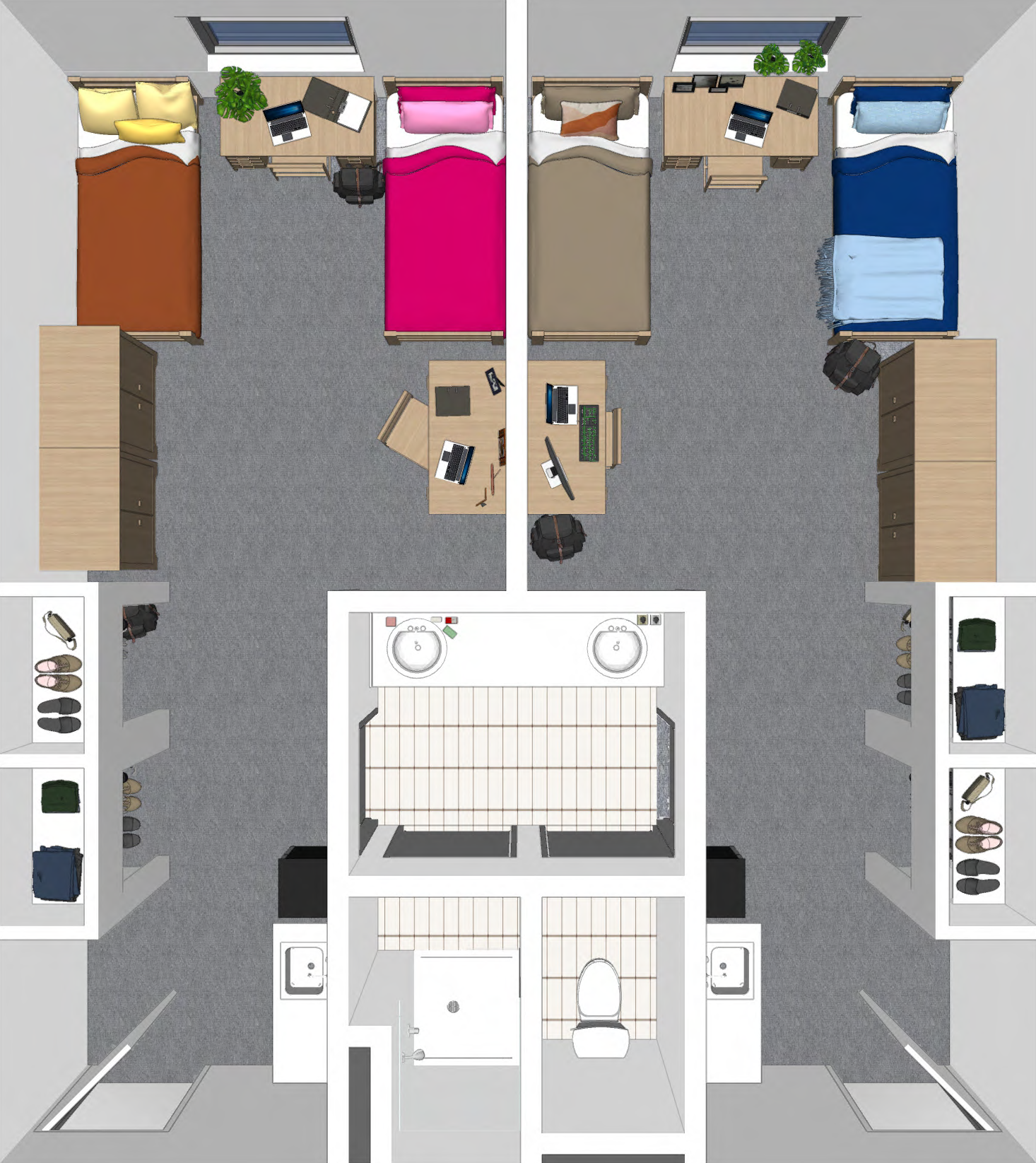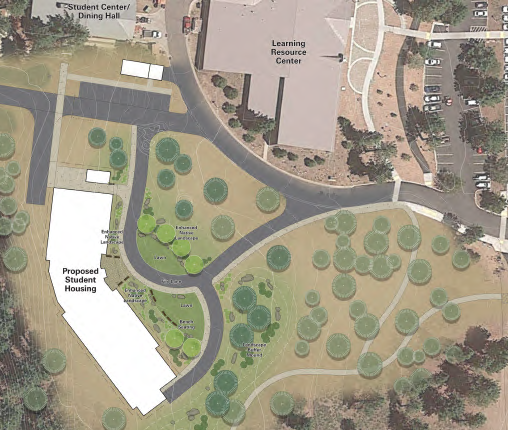LTCC Secures Critical State Funding to Construct On-Campus Student Housing
June 30, 2022
 With the California State Legislature’s approval of the California 2022-23 Budget Act and Gov. Gavin Newsom’s signature anticipated shortly, Lake Tahoe Community College
is set to receive $39.4 million in funding to construct on-campus student residential
living with.
With the California State Legislature’s approval of the California 2022-23 Budget Act and Gov. Gavin Newsom’s signature anticipated shortly, Lake Tahoe Community College
is set to receive $39.4 million in funding to construct on-campus student residential
living with.
LTCC will construct a 100-bed housing facility serving California residents who are low-income, full-time college students. Construction could begin as soon as Summer 2023, with students moving in no later than Fall 2025 - provided that appropriate construction approvals are granted in a timely manner.
“LTCC has been working on bringing housing to South Lake Tahoe for nearly a decade,” said LTCC Superintendent/President Jeff DeFranco. “Until now, the high cost of construction in the Tahoe Basin has made this project infeasible. This funding allows LTCC to fulfill its vision of bringing affordable student housing to campus, and will help students enroll and succeed in their educational mission.”
 LTCC applied for consideration for this funding in October 2021, and worked diligently
to secure the support of community partners, the California Community Colleges’ Chancellor’s Office, the California Legislature, and Governor Gavin Newsom. The project will include semi-suite units providing 100 beds. Approximately 90 beds
will be constructed in a double-occupancy configuration, and 10 units will be retained
for single occupancy to support non-traditional students, including military veterans,
older adults, and students who have privacy or mental health needs that can best be
accommodated in a private unit.
LTCC applied for consideration for this funding in October 2021, and worked diligently
to secure the support of community partners, the California Community Colleges’ Chancellor’s Office, the California Legislature, and Governor Gavin Newsom. The project will include semi-suite units providing 100 beds. Approximately 90 beds
will be constructed in a double-occupancy configuration, and 10 units will be retained
for single occupancy to support non-traditional students, including military veterans,
older adults, and students who have privacy or mental health needs that can best be
accommodated in a private unit.
Plans call for an approximately 32,000-square-foot housing facility that provides separate living units, shared community spaces, and close proximity to the college’s existing Student Center. This center already houses a commercial-grade kitchen, a cafeteria-style serving area with grab-and-go food options, and a large, open space to accommodate sit-down dining service. Each bedroom will include a small area with a refrigerator, microwave, countertop, cupboard, and sink, allowing students to prepare small meals and snacks in their rooms.
LTCC will establish maximum rental amounts to ensure that low-income students can access these facilities. Specifically, rents will start at $500/bed per month for double-occupancy rooms and $795/bed for single-occupancy rooms when the facility opens.
In order to access residential living on campus, students will be required to register and maintain a full-time load of 12 units minimum each quarter. This supports students being able to complete their degrees and transfer to four-year institutions in a timely fashion.
Securing the funding needed to plan for and construct on-campus student housing has been nearly 10 years in the making. Residential living has been championed by President DeFranco since his arrival on campus in 2012, and it was first formally included in LTCC’s Master Plan in 2014. In November of that year, LTCC included ballot language as part of the Measure F bond to pay for a feasibility study to assess the need for on-campus housing. This feasibility study and subsequent planning efforts positioned LTCC to compete, and ultimately secure, this funding.
“The benefits of local taxpayers supporting our Measure F bond keep coming,” said DeFranco. “We would have struggled to come up with the study costs without local voter support. This is yet another example of the importance of this bond and what it is bringing to our community. This small investment is leading to big gains.”
After Measure F was approved by a majority of local voters, LTCC contracted with a vendor to complete the feasibility study in 2016. Student demand was gauged through focus group meetings and a survey. In 2019, LTCC contracted with The Concourse Group to develop a residential living concept and explore different project scopes. The considerable task of finding the funding to construct housing remained a hurdle, with skyrocketing California construction costs further complicating LTCC’s ability to pay for such a large and expensive project.
In 2020, LTCC hired a Senior Director of Government Relations and Grant Development to focus on securing funding for LTCC projects. Last year, Senate Bill 169 was passed, creating a $1 billion investment for construction of student housing at community colleges. LTCC submitted its Student Housing Application with the California Department of Finance in October 2021, requesting just over $39 million.
 In December, staff from California’s Community College Chancellor’s Office visited
LTCC college leadership to discuss this funding request, construction plans, and the
South Shore community’s critical housing need. That visit, combined with a focused
effort by college leadership members to advocate with state legislators directly in
Sacramento with approved plans in hand, got LTCC included on a list of community colleges
to be considered for housing funding.
In December, staff from California’s Community College Chancellor’s Office visited
LTCC college leadership to discuss this funding request, construction plans, and the
South Shore community’s critical housing need. That visit, combined with a focused
effort by college leadership members to advocate with state legislators directly in
Sacramento with approved plans in hand, got LTCC included on a list of community colleges
to be considered for housing funding.
The approved state budget provides additional money beyond SB 169, adding $542 million in construction funding for 11 community colleges to help address affordable student housing needs around the state. It’s part of a record $300 billion budget made possible by a growth in tax revenues fed by income gains among California’s wealthiest residents. It contains significant funding to support college and university student housing and campus expansion projects. It also expands financial aid for older students by increasing the Cal Grants tuition coverage program.
The Tahoe Basin is facing an affordable housing crisis. With 15 million visitors coming to the Basin annually, a large percentage of Lake Tahoe’s housing stock is being used as second homes or as short-term rentals. The COVID-19 pandemic and the opportunity some had for remote work exacerbated existing housing shortages. Average home prices have increased by 35 percent since 2020, and the rental vacancy rate is regularly below 2 percent, making finding an affordable rental quite difficult.
The 2019 South Shore Region Housing Needs and Opportunities study conducted by the Tahoe Prosperity Center found that 48 percent of renters and 34 percent of owners in the South Shore area are housing-cost burdened, including 85 percent of households making under $40,000 per year. The study also indicates a shortage of rentals at any price in the area and of those available, there is a shortage of units in good condition.
